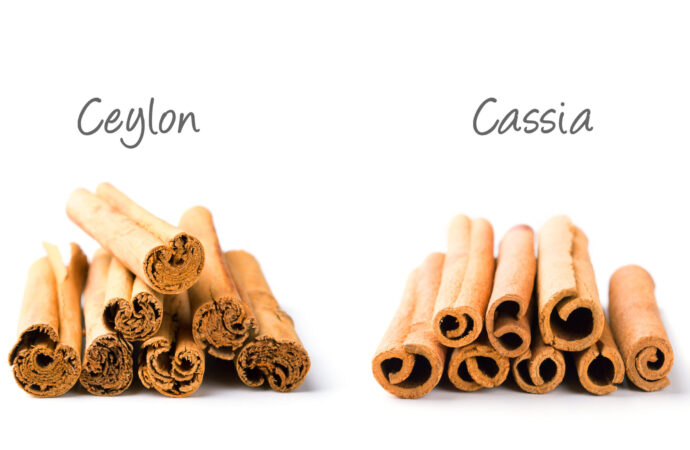Cinnamon adds warmth, sweetness, and a burst of flavour to everything it touches. But did you know it comes in two types? Ceylon, the “true cinnamon,” delivers a delicate, sweet flavour, packs in health benefits, and is safe for daily use. Cassia, its bold and spicy cousin, adds a punch to dishes but carries a higher risk due to its coumarin content. Stir it into smoothies, sprinkle it on desserts, or use it for wellness—choosing the right cinnamon elevates your cooking and boosts your health. It’s all about balancing flavour, benefits, and safety!
What Is the Difference Between Ceylon and Cassia Cinnamon?

Ceylon Cinnamon (Cinnamomum verum), often called “true cinnamon,” grows primarily in Sri Lanka and parts of southern India. It stands out for its delicate, mild flavour and light tan-brown colour, making it the superior variety. Its thin, soft, and tightly curled sticks contain much less cinnamaldehyde, the compound that gives cinnamon its distinct aroma and flavour. This lower cinnamaldehyde content creates a sweeter, more subtle taste, perfect for desserts, beverages, and certain savoury dishes.
In contrast, Cassia Cinnamon (Cinnamomum cassia) is primarily cultivated in China and dominates most supermarket shelves. Its darker, thicker, and rougher sticks deliver an intense, spicier flavour due to its higher cinnamaldehyde content. Cassia is more affordable and widely used in cooking, especially for savoury dishes or recipes requiring a bold cinnamon punch. It’s the variety you’ll most commonly find in grocery stores worldwide.
Health Benefits: Ceylon vs. Cassia – Are They the Same?
Both Ceylon and cassia cinnamon deliver significant health benefits. They possess antioxidant and anti-inflammatory properties and can help regulate blood sugar levels. Additionally, these varieties contain bioactive compounds that may protect against cellular damage and reduce the buildup of tau proteins in the brain, which is linked to Alzheimer’s disease.
The Role of Coumarin
The key difference lies in their safety profiles, primarily due to coumarin, a naturally occurring compound. Cassia cinnamon contains 5-10% coumarin, while Ceylon cinnamon has only trace amounts (around 0.0004%). This stark contrast makes Ceylon cinnamon a much safer choice for regular consumption.
Coumarin and Its Health Risks
Excessive coumarin intake has been associated with liver and kidney damage. Just 1-2 teaspoons of cassia cinnamon per day can exceed the tolerable daily intake, leading to toxicity. Regular consumption of large amounts of cassia cinnamon—whether in food or supplements—can result in serious long-term health issues.
Why Ceylon Cinnamon is the Safer Choice
Thanks to its negligible coumarin content, Ceylon cinnamon is the safer option for frequent use. You can enjoy its health benefits, such as improved digestion, better blood sugar control, and cognitive protection, without worrying about potential harm to your liver or kidneys.
Which Cinnamon Should You Choose: Ceylon or Cassia?
If you regularly use cinnamon for cooking, baking, or health supplements, Ceylon cinnamon is the better choice. Its mild flavour and low coumarin content make it ideal for daily consumption. You can easily add it to smoothies, oatmeal, tea, or baked goods, enjoying its sweet, subtle taste that complements a variety of dishes. Ceylon cinnamon is versatile and safe for long-term use, making it the top pick for health-conscious individuals.
While cassia cinnamon still offers health benefits, it’s best consumed in moderation due to its higher coumarin content. Its bold, spicier flavour suits occasional use, particularly in recipes that need a stronger cinnamon taste, such as savoury dishes, curries, or holiday desserts. However, because of its high coumarin content, you should avoid regular consumption in large quantities. For health benefits, Ceylon cinnamon is the safer and more effective choice.
Taste and Culinary Use: Ceylon vs. Cassia
The flavour profile plays a key role in choosing the right cinnamon. Ceylon cinnamon provides a subtle sweetness, perfect for lighter, more delicate recipes. It enhances baked goods, beverages, desserts, and even some savoury dishes without overpowering other flavours. If you prefer a gentle, sweet cinnamon taste, Ceylon is the ideal option.
On the other hand, cassia cinnamon has a more intense, spicy flavour, making it better suited for recipes where cinnamon needs to stand out. It works well in savoury dishes like curries and stews and adds depth to rich desserts such as cinnamon rolls, spiced cakes, or pumpkin pie. If you like a robust, pungent cinnamon flavour, cassia is the way to go, but use it sparingly to avoid overpowering your dish.
Conclusion: Which Is Better for You?
The choice between Ceylon and cassia cinnamon comes down to your health goals, taste preferences, and how often you use the spice. If you’re looking for a safer, versatile option for everyday use, Ceylon cinnamon is the clear winner. Its low coumarin content and delicate, sweet flavour make it perfect for regular cooking, baking, and even as a health supplement. You can enjoy its numerous benefits, including better digestion, blood sugar regulation, and cognitive protection, without worrying about adverse effects.
On the other hand, cassia cinnamon is best reserved for occasional indulgence or recipes that call for a bold, spicy kick. While it offers health benefits, its higher coumarin content means moderation is key to avoiding long-term health risks. Whether you’re enhancing your dishes or prioritizing your wellness, understanding the unique qualities of Ceylon and cassia cinnamon empowers you to make informed choices that suit your lifestyle and needs.
 Food Manifest
Food Manifest 


















